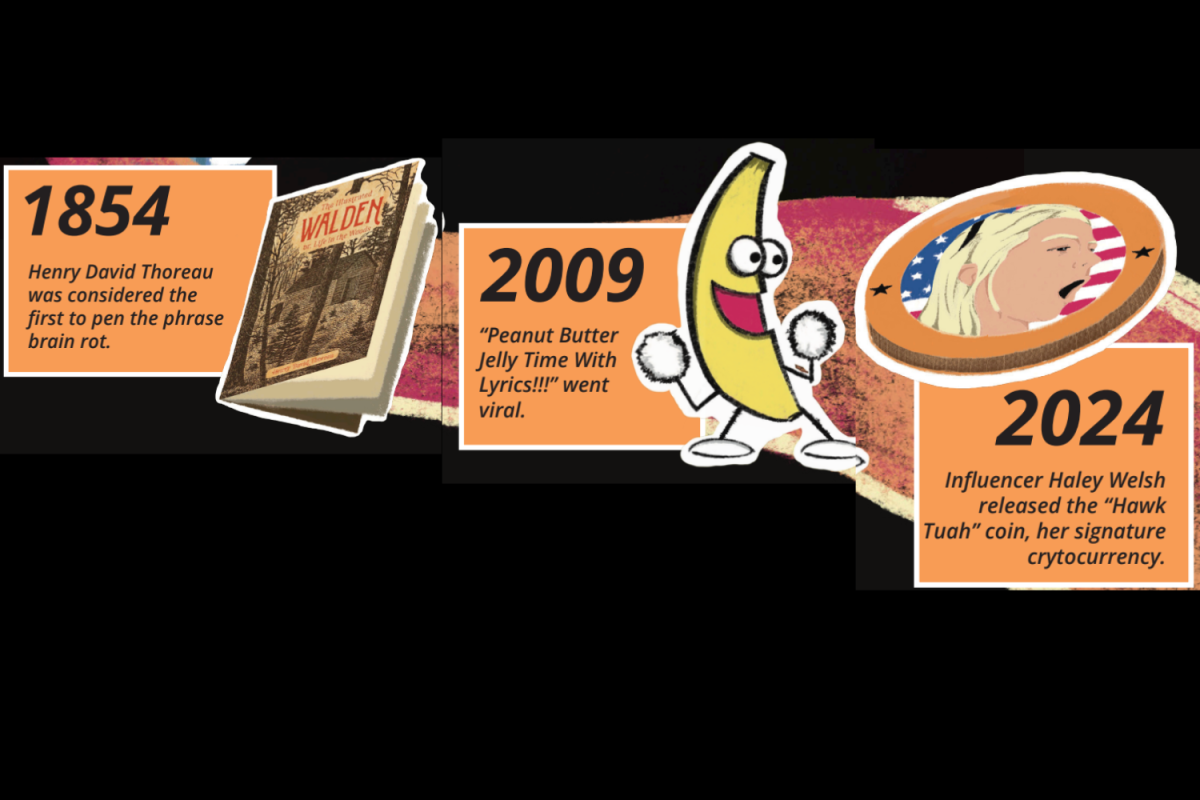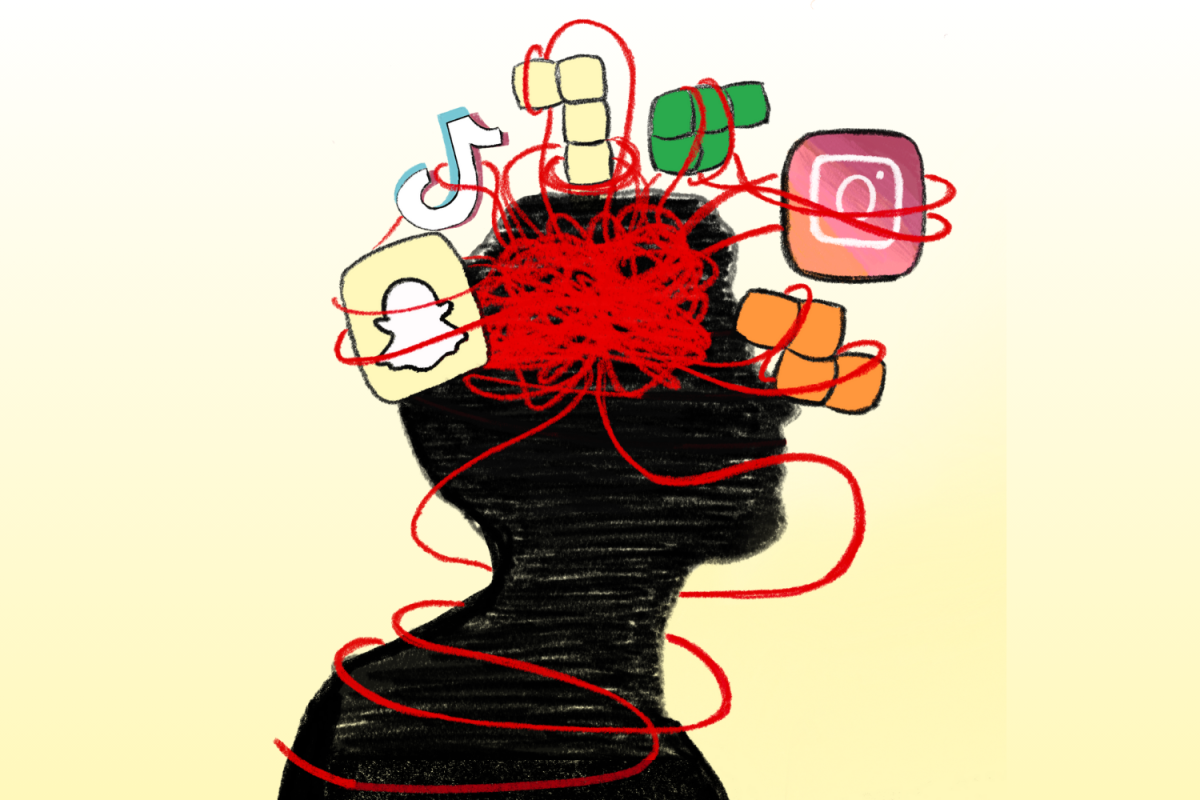In 2024, Oxford University Press named “brain rot” its word of the year, marking a new level of social relevance for the term — though it has existed in popular culture for decades, appearing in everything from internet memes to viral sensations.
The phrase brain rot originates from transcendentalist Henry David Thoreau’s “Walden,” his account of a 2-year stay at Walden Pond in Massachusetts. There, he criticized the rapidly industrializing world of the 19th century — particularly the rise of the telegraph, which he viewed as a distraction rather than a necessity. Thoreau wrote, “While England endeavours to cure the potato rot, will not any endeavour to cure the brain rot — which prevails so much more widely and fatally?”
Since then, the phrase has evolved into a staple of meme culture. The rise of digital communication has made it easier than ever to spread content, allowing memes to go viral overnight.
“I’ve heard a lot of people calling brain rot immature,” senior Ashwin Kamchetty said. “But as long as you remain open-minded to it and take it less seriously, it definitely has humorous value.”
Brain rot memes get their name from their seemingly meaningless nature, serving no purpose other than to “rot your brain.” With the onset of short-form content platforms such as TikToks and Instagram reels, brain rot memes have become even more prevalent.
The creation of the internet accelerated the spread of brain rot culture. With new tools of animation, creation and communication at hand, memes and trends began to form and gain notoriety. Early examples of this cultural shift include texting slang like “LOL” and viral animations like “Dancing Baby.”
Brain rot’s modern roots in social media trace back to the early 2010s, when platforms like YouTube and Vine became hubs for random, absurd humor. Websites such as Reddit and 4chan also became key centers for meme-sharing.
By the 2020s, brain rot had evolved into its current form, fueled by platforms like Instagram and TikTok. The endless scrolling format of short-form video content gives users unlimited access to all kinds of content. Memes like “Skibidi Toilet” gained massive followings, despite having no particular meaning within itself, with Skibidi Toilet in particular becoming an icon of the brain rot movement. The channel’s creator gained over 45 million subscriptions, with tens of millions of fans watching his content.
“Short-form media has definitely affected attention spans,” said Philip Bair, communication studies lecturer at San José State University. “My students often admit to me that they spend hours on TikTok a day. They’re simply not bored anymore and it causes people to be more withdrawn and avoid positive risk-taking behaviors.”
The 2020s also saw a rise in AI-generated nonsensical videos. Many internet personalities have embraced intentionally “cringe-worthy” performances to generate views. Streamers like Malik Ambersley, also known as “NPC Miles Morales,” have gained viral fame by performing exaggerated, over-the-top antics in public.
Brain rot’s appeal among younger audiences has led to criticism from older generations who argue that it weakens attention spans and lacks substance.
“I think an issue with adults understanding teenagers is the age difference,” junior Ashwath Anoop said. “From their point of view, they think every kid is the same, yet from a high schooler’s point of view, there is definitely a difference. The upperclassmen usually view the younger generation’s behaviors as erratic as they haven’t been influenced by brain rot in the same way.”
The algorithms of social media have also propelled many to stardom. One of the most well-known cases of sudden internet virality was Haley Welch. Her vulgar language engrained itself within brain rot culture. Welch quickly took advantage of her marketability, launching multiple projects, including a podcast, a merchandise line and even her own cryptocurrency.
“A concern on brain rot is its vocabulary,” Anoop said. “The term inherently means that there is nothing intellectual about it, and it becomes a concern when the younger generation begin using these terms in daily life.”
As technology and social media evolve, so will brain rot. Its presence in digital culture is undeniable, reflecting the humor, creativity and absurdity of the internet generation.































































Nawk Nuah • Feb 3, 2025 at 12:20 pm
OMG I just read this article about “brain rot” and it was SO GOOD!!! It’s all about how staring at screens all day can turn our brains into mush (lol same ). But like, it’s not just doom and gloom—it actually gives super easy tips to fix it, like “touch grass” and “stop scrolling so much” . Honestly, it made me feel way better about my TikTok addiction . Big shoutout to the writer for keeping it real and not making it boring. 10/10 would recommend!!! ✨